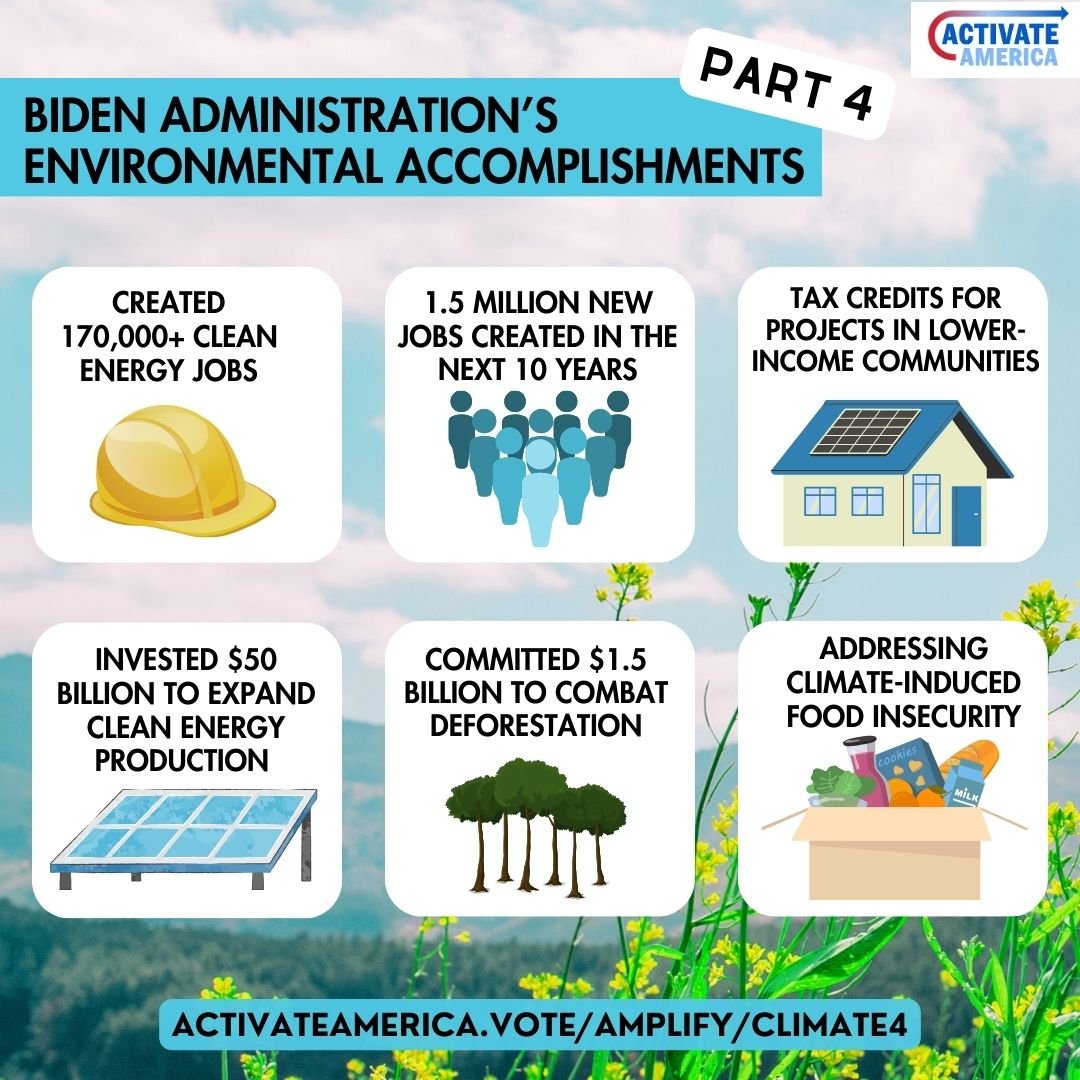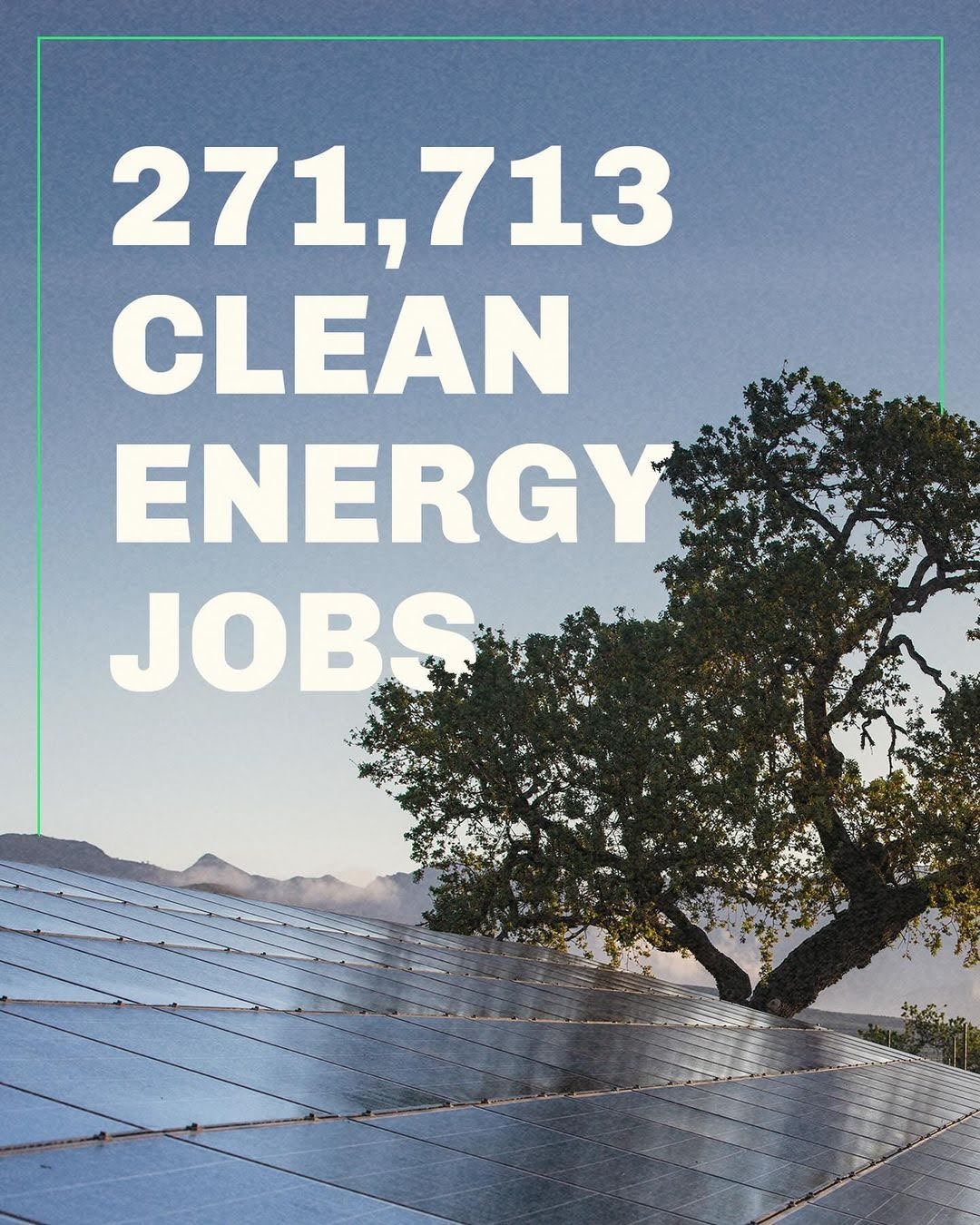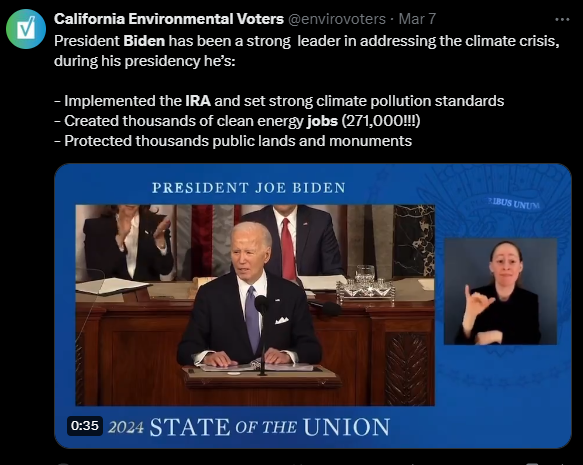Amplify: Biden Administration’s Wide-Ranging Climate Accomplishments (Part 4)
This is Part 4 of a series amplifying the Biden Administration's climate accomplishments. In Part 1, Part 2 and Part 3 of this series, we reviewed the Biden Administration’s climate accomplishments through legislative and executive action. In Part 4, we highlight how the Biden Administration has engineered a pro-environment agenda that also drives economic and job growth, increases American competitiveness, and enhances global peace and stability
Highlights— Driving Job Growth
In Just One Year: By August 2023, twelve months after passage of the Inflation Reduction Act, its climate provisions had already created more than 170,000 clean energy jobs and spurred more than $278 billion in new investments across 272 new projects nationwide.
The Next Ten Years: Looking forward, independent third parties have projected that the IRA will create more than 1.5 million new jobs over the next 10 years.
Incentivizing Higher Wages: The IRA grants lucrative tax credits to clean energy projects (e.g., wind and solar) that create jobs. In addition, to maximize worker pay, those tax credits increase five-fold if the project pays the prevailing wage or offers apprenticeship programs for advancement to higher-paying positions.
Creating Jobs Where Needed: The Act also provides an additional 10% tax credit for clean energy projects placed in lower-income communities or those where fossil fuel workers have been (or are likely to be) displaced.
Highlights— Economic Growth
Rewarding Good Behavior: The Biden Administration is using tax credits and other incentives to reward American consumers and industry for developing and using clean energy. Private companies taking advantage of these incentives have announced over a trillion dollars of new investment in clean energy manufacturing, EV’s and power generation.
Made in the U.S.A.: The tax incentives were tailored by the Administration to drive U.S. industrial growth. The electric vehicle tax credits for consumers apply only to cars made domestically and batteries in which 50% of the components are made or assembled in the U.S. Likewise, $5 billion in financing loans to build new (or retrofit) EV factories are available only to facilities located in the U.S.
Retooling American Manufacturing: The IRA invests a record $50 billion in expanding 21st century energy production capabilities, which has created high-paying jobs and ensures U.S. competitiveness in the rapidly expanding global energy market.
Upgrading the Auto Industry: Michigan, Ohio, Illinois, and Indiana, the traditional hub of the U.S. auto industry, have each received private investments of billions of dollars in the EV industry and have collectively added tens of thousands of new jobs. Similarly, North Carolina, South Carolina, and Georgia are experiencing an economic boom due to billions of dollars of private investment in battery research and production.
US Electric Vehicle Leadership: The tax credits have supercharged the EV industry. By March 2023, EV sales had risen to over 90,000 per month -- from only 20,000 in 2020. Analysts project that private sector investment in EV production will reach $5.1 trillion annually by 2050 – making the U.S. the global leader in electric vehicle manufacturing. Read the full list here.
Highlights— National Security, Peace and Stability
Addressing Military Preparedness. Under the Biden Administration, the Department of Defense is actively addressing the impact of climate change on military preparedness.
Assuming International Leadership: By rejoining the Paris Climate Agreement, President Biden has committed the world’s largest economy to reducing greenhouse gasses, moving to net zero greenhouse gas emissions by 2050 and eliminating U.S. fossil fuel generation by 2035.
Reducing the Global Threat: The Biden administration is also actively engaged in wide-ranging efforts to decrease worldwide climate threats, ranging from leveraging U.S. diplomacy to advance the phase-out of fossil fuels, establishing a bilateral working group with China, addressing global climate-induced food insecurity, contributing financial support for developing countries to build climate resilience, driving “climate-smart” agriculture, committing $1.5 billion to reduce deforestation, and working through USAID and with multilateral development banks toassist emerging market countries to accelerate the transition from coal to green energy.
Despite a recalcitrant Congress and the reckless legacy of his predecessor, President Biden’s legislative and executive achievements have been historic in scope and have masterfully woven his broad pro-environment goals into an industrial, economic and national security agenda that will maximize U.S. growth and competitiveness for the 21st Century.
Amplify on Social Media:




